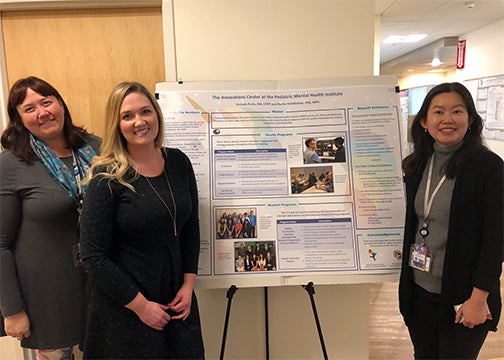Summary
The Denver | Anschutz Medical Campus is helping clinical faculty be successful in two very different missions. Early-career clinical faculty tend not to have funding for hiring research staff. So the Child & Adolescent Division in Psychiatry created an in-house research support team to assist with research methodology. The results: savings in time/effort, increased scholarly productivity (manuscript submissions/publications and presentations at professional conferences), improved morale/staff retention, and higher quality in clinical care.
Submission Highlights
Team Information

Pictured Above:
- Melissa Sinclair, Director of Finance & Administration-Department of Psychiatry
- Emmaly Perks, Senior PRA and Education & Training Manager
- Merlin Ariefdjohan, Assistant Professor and Director of the Innovations Center
- Funding support from Douglas Novins, MD, Professor, Vice Chair, and Director-Division of Child & Adolescent Psychiatry
- University of Colorado Denver | Anschutz Medical Campus.
Description
Early career clinical faculty face the pressure of performing academically while meeting demanding clinical commitments. They often express concerns that scholarly productivity is hampered by the lack of time and funding. These are major life stressors, particularly in academic medicine where a successful research program is one criterion for promotion. Consequently, this can lead to job dissatisfaction, depression and burnout.
A clinical faculty typically hires research staff to develop and coordinate their research agenda. However, early career faculty in the Child and Adolescent Division in Psychiatry tend not to have funding for this. On-campus resources are also limited and entail service charges.
To solve this issue, an in-house research support center was created within the Division. Two highly qualified research assistants led by an Assistant Professor staff the Center. Team members are proficient in research methodology including regulatory, study design, data management, statistical analysis, and others. In order to get assistance, the faculty submits a request via an online ticketing system. A team member is 'dispatched' to formulate a research work plan and then carries out the tasks accordingly. Project deliverables and outcomes are subsequently tracked. Annual faculty survey is administered to receive feedback on the Center's performance.
How does this benefit the University?
Time-saving
- 96% of faculty (n=27) indicated that the Center provides more expedient assistance than university-wide resources. Due to this, more research tasks can be completed in a shorter period of time, which increases scholarly productivity in general (e.g., submissions/publications of manuscripts, presentations at national conferences, etc.).
Greater visibility
- With an increase in scholarly output as mentioned above, the University gains more visibility in 'the academic world' through the work of the faculty.
Improvement in morale; staff retention
- By receiving prompt assistance and delegating research tasks to the team members at the Center, faculty expressed a renewed interest toward research. Subsequently, this translates to a greater sense of job satisfaction and feelings of positivity in practicing in academic medicine. Inadvertently, faculty can also better concentrate on providing quality clinical care since their research agenda is concurrently being taken care of to a certain degree.
Implementation/Future Plans
The Center was set-up in July 2015 to primarily provide research consultation and assistance. However, the influx of new faculty into the Division created additional scholarly needs. Consequently, team members also created training programs for building research skills, and organized scholarly events to foster collaboration among faculty members.
For the past several years, the Center received a consistent high-performance rating for its assistance and programming efforts. There is also a substantial increase in manuscript submissions/publications and presentations at professional conferences. Due to its effectiveness and significant impact in elevating clinical scholarship in the Division, there are plans to expand the Center at the Departmental level. In addition to hiring more research staff, specialized sub-units (e.g., pre/post-award, regulatory (both for animal and human projects), biostatistics, etc.) may be created as part of this expansion to increase the capacity of the Center.




